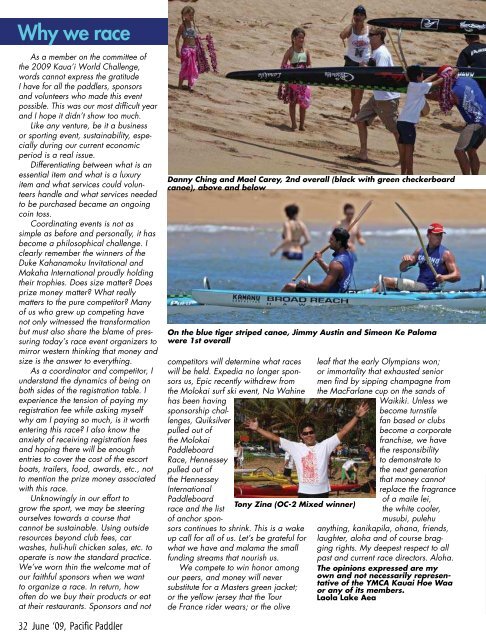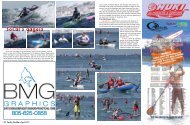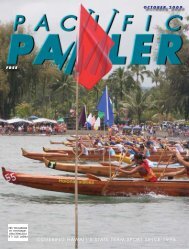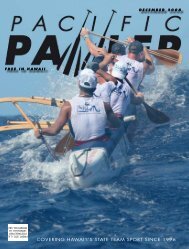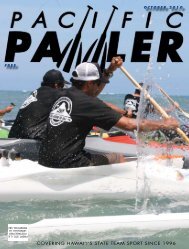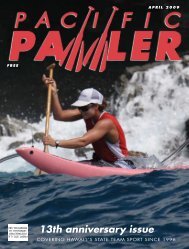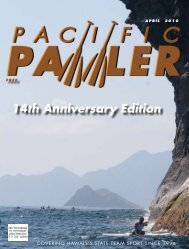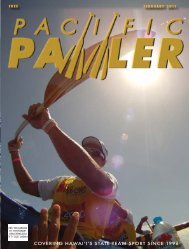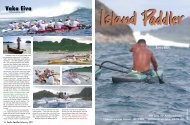You also want an ePaper? Increase the reach of your titles
YUMPU automatically turns print PDFs into web optimized ePapers that Google loves.
Why we race<br />
As a member on the committee of<br />
the <strong>2009</strong> Kaua’i World Challenge,<br />
words cannot express the gratitude<br />
I have for all the paddlers, sponsors<br />
and volunteers who made this event<br />
possible. This was our most difficult year<br />
and I hope it didn’t show too much.<br />
Like any venture, be it a business<br />
or sporting event, sustainability, especially<br />
during our current economic<br />
period is a real issue.<br />
Differentiating between what is an<br />
essential item and what is a luxury<br />
item and what services could volunteers<br />
handle and what services needed<br />
to be purchased became an ongoing<br />
coin toss.<br />
Coordinating events is not as<br />
simple as before and personally, it has<br />
become a philosophical challenge. I<br />
clearly remember the winners of the<br />
Duke Kahanamoku Invitational and<br />
Makaha International proudly holding<br />
their trophies. Does size matter Does<br />
prize money matter What really<br />
matters to the pure competitor Many<br />
of us who grew up competing have<br />
not only witnessed the transformation<br />
but must also share the blame of pressuring<br />
today’s race event organizers to<br />
mirror western thinking that money and<br />
size is the answer to everything.<br />
As a coordinator and competitor, I<br />
understand the dynamics of being on<br />
both sides of the registration table. I<br />
experience the tension of paying my<br />
registration fee while asking myself<br />
why am I paying so much, is it worth<br />
entering this race I also know the<br />
anxiety of receiving registration fees<br />
and hoping there will be enough<br />
entries to cover the cost of the escort<br />
boats, trailers, food, awards, etc., not<br />
to mention the prize money associated<br />
with this race.<br />
Unknowingly in our effort to<br />
grow the sport, we may be steering<br />
ourselves towards a course that<br />
cannot be sustainable. Using outside<br />
resources beyond club fees, car<br />
washes, huli-huli chicken sales, etc. to<br />
operate is now the standard practice.<br />
We’ve worn thin the welcome mat of<br />
our faithful sponsors when we want<br />
to organize a race. In return, how<br />
often do we buy their products or eat<br />
at their restaurants. Sponsors and not<br />
Danny Ching and Mael Carey, 2nd overall (black with green checkerboard<br />
canoe), above and below<br />
On the blue tiger striped canoe, Jimmy Austin and Simeon Ke Paloma<br />
were 1st overall<br />
competitors will determine what races<br />
will be held. Expedia no longer sponsors<br />
us, Epic recently withdrew from<br />
the Molokai surf ski event, Na Wahine<br />
has been having<br />
sponsorship challenges,<br />
Quiksilver<br />
pulled out of<br />
the Molokai<br />
Paddleboard<br />
Race, Hennessey<br />
pulled out of<br />
the Hennessey<br />
International<br />
Paddleboard<br />
race and the list<br />
of anchor sponsors<br />
continues to shrink. This is a wake<br />
up call for all of us. Let’s be grateful for<br />
what we have and malama the small<br />
funding streams that nourish us.<br />
We compete to win honor among<br />
our peers, and money will never<br />
substitute for a Masters green jacket;<br />
or the yellow jersey that the Tour<br />
de France rider wears; or the olive<br />
Tony Zina (OC-2 Mixed winner)<br />
leaf that the early Olympians won;<br />
or immortality that exhausted senior<br />
men find by sipping champagne from<br />
the MacFarlane cup on the sands of<br />
Waikiki. Unless we<br />
become turnstile<br />
fan based or clubs<br />
become a corporate<br />
franchise, we have<br />
the responsibility<br />
to demonstrate to<br />
the next generation<br />
that money cannot<br />
replace the fragrance<br />
of a maile lei,<br />
the white cooler,<br />
musubi, pulehu<br />
anything, kanikapila, ohana, friends,<br />
laughter, aloha and of course bragging<br />
rights. My deepest respect to all<br />
past and current race directors. Aloha.<br />
The opinions expressed are my<br />
own and not necessarily representative<br />
of the YMCA Kauai Hoe Waa<br />
or any of its members.<br />
Laola Lake Aea<br />
Boy Kaluhiokalani-Chun Fook<br />
<strong>Pacific</strong> Northwest Outrigger Racing<br />
Canoe Association (PNW-ORCA) is<br />
a coalition of 17 clubs in the states of<br />
Washington, Oregon and Montana.<br />
Their president Boy Chun Fook is 49<br />
and lives in Tacoma, Washington with<br />
his wife Brenda and their four children.<br />
He is also the Juniors Coach for the<br />
Kikaha O Ke Kai Outrigger Canoe<br />
Club in Federal Way, Washington.<br />
Boy Chun Fook grew up on the<br />
island of Oahu for 31 years, moved<br />
to Salt Lake City, Utah in '89, then<br />
to Tacoma in '92. He helped start<br />
Kikaha O Ke Kai in '96 and was also<br />
the head coach. Boy was elected<br />
PNWORCA secretary in '96 and then<br />
elected president in '98.<br />
Being part Hawaiian ('mixed plate'<br />
he says - Hawaiian, Maori, Filipino,<br />
Chinese, Puerto Rician and Irish) and<br />
very involved with the surrounding<br />
<strong>Pacific</strong> Northwest Hawaiian community<br />
and paddlers, his passion for outrigger<br />
canoe paddling has been the link to<br />
keep the culture and sport alive for all<br />
to enjoy.<br />
Where did you first paddle<br />
I started in '73 on Ewa Beach,<br />
Oahu, with the Ewa Beach Outrigger<br />
Canoe Club, practicing out from the<br />
rough and sometimes limu infested<br />
Ewa Beach Park and Iroquois Point<br />
Lagoon. I also paddled with Kukini CC<br />
and Koa Kai CC before coming to the<br />
mainland and joining Kikaha O Ke Kai<br />
OCC in Washington<br />
Who were your coaches<br />
My first coaches were Kammy and<br />
Sonny VeraCruz, the original Beach<br />
Boys from Waikiki. They paddled for<br />
Hui Nalu way back then. I learned the<br />
What is the PNW-ORCA<br />
PNW-ORCA started in the early 90’s when former<br />
President Torey Browne brought an OC-6 up from<br />
California. Torey has been the backbone in outrigger<br />
paddling here in the <strong>Pacific</strong> North West (PNW). With her<br />
and Brenda’s help, we continue to move our association<br />
forward.<br />
Our racing season is primarily April through September.<br />
There is an OC-1 winter series. When the air temperature<br />
is in the thirties and the water isn’t much warmer, the<br />
hardcore paddlers still come out.<br />
There are two big races in the summer series, the Gorge<br />
Games and the PNW Challenge. This year’s Gorge race<br />
old 'Hawaii Five-O' stroke where the<br />
reach was so way out your chest hit<br />
the gunnels and the paddle was old<br />
style, no T-top, and very big blades.<br />
Here in Washington, Nolan<br />
Cabellero taught me to update my<br />
paddling stroke. I still had my old<br />
paddle from '84. Nolan, now living<br />
in Mililani, was the one person that<br />
willingly shared his knowledge when I<br />
first started paddling again here. We<br />
always talk story on the phone, and I<br />
update him on our style up here now,<br />
and he still shares his memories.<br />
What memories of paddling in<br />
Hawaii come to mind<br />
In '75, I helped start the Na Opio<br />
High School Paddling Scholastic<br />
League with Gardner Brown. Our team<br />
won the state high school men’s onemile<br />
race in '77 over Kamehameha<br />
and Mililani whom took 2nd and 3rd<br />
with about seven other clubs in the<br />
race. That victory was sweet given that<br />
we had battled all season.<br />
We paddled, practiced and raced<br />
in the Old White Horse Koa Canoe that<br />
had a banana bend in it due to leaning<br />
against a coconut tree for years before<br />
we restored it. The Bishop Estate leased<br />
it to us for $1 a year because we did<br />
the restoring. Paddling that Koa canoe<br />
was so much different than paddling<br />
a fiberglass canoe. You could feel the<br />
'mana' when you were racing or just<br />
paddling along.<br />
How is paddling different on the<br />
mainland<br />
Outrigger paddling is pretty new<br />
here in the Northwest. Our paddlers<br />
come from kayaking, dragon boating<br />
or rowing, or are just recruits attracted<br />
Photo by Scott Moody<br />
by the competition and opportunities<br />
for making friends. Many see our<br />
canoes and ask, 'what’s that'<br />
Why is paddling so important<br />
While living and paddling in<br />
Hawaii, I made lots of bad choices<br />
and took paddling and living in<br />
Hawaii for granted till I got married<br />
and left the islands in late '89. So<br />
when I heard of a new Washington<br />
outrigger club forming, I got involved<br />
to give-back my knowledge and love<br />
for the culture and sport. Our ohana<br />
here has as much aloha spirit as the<br />
Kamaaina, which makes it feel like<br />
home.<br />
It’s hard, constant volunteering<br />
work, to paddle and keep a club or<br />
association moving forward. If you<br />
stop supporting, it slows down or<br />
sometimes folds and it’s so hard to<br />
build a club over. You have to have<br />
a passion for what you do and love.<br />
Paddling brings the best out of me and<br />
I don’t want to stop working behind<br />
the scenes. If it weren’t for a loving<br />
and understanding wife and supporter<br />
who are also dedicated to hard work,<br />
I probably wouldn’t be able to do it<br />
every year. Where can you get all of<br />
the family into one sport and culture<br />
and always have the best potlucks<br />
after the races<br />
by Andy Michels<br />
is set for July 18 and 19 on the Columbia River, upstream<br />
of Portland, Oregon. The area is famous for its windsurfing.<br />
The wind constantly blows up-stream producing<br />
surfing opportunities we just don’t get in most of our<br />
races. The Gorge Games include white river paddling,<br />
wind surfing, and mountain bike competitions. Tui Tonga<br />
won the race in '07.<br />
The PNW Challenge is August 29th on Lake<br />
Washington in Seattle. — see the Oct. '08 <strong>Pacific</strong><br />
<strong>Paddler</strong> article. Crews from Hawaii and California have<br />
expressed interest in coming this year to paddle a 26<br />
mile, nine man change-out race, that goes under two<br />
floating bridges and past Bill Gates’ house.<br />
32 <strong>June</strong> ‘09, <strong>Pacific</strong> <strong>Paddler</strong> pacificpaddler.com <strong>June</strong> ‘09 33


